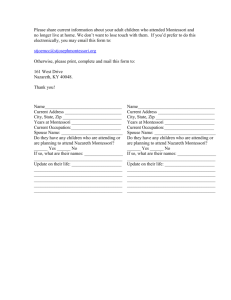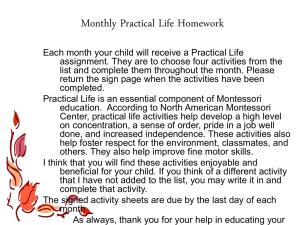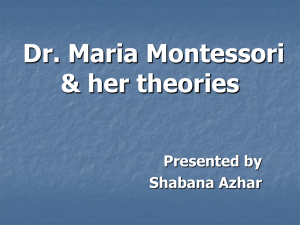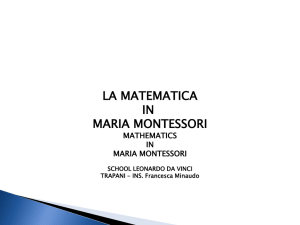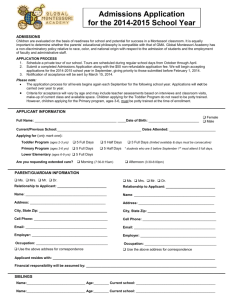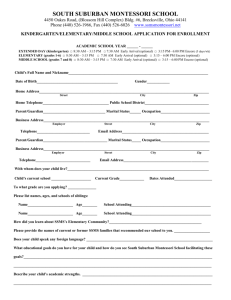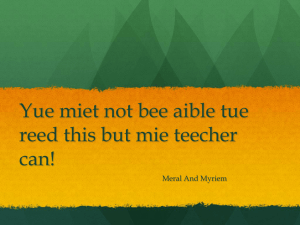faq kenneth - Discovery House
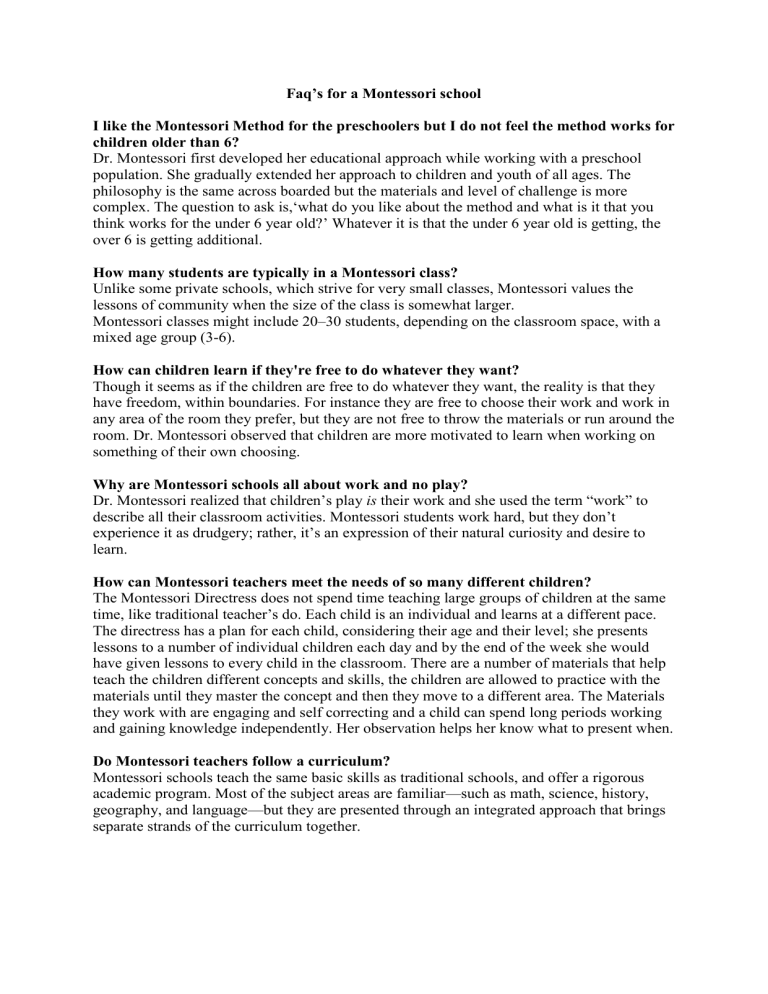
Faq’s for a Montessori school
I like the Montessori Method for the preschoolers but I do not feel the method works for children older than 6?
Dr. Montessori first developed her educational approach while working with a preschool population. She gradually extended her approach to children and youth of all ages. The philosophy is the same across boarded but the materials and level of challenge is more complex. The question to ask is,‘what do you like about the method and what is it that you think works for the under 6 year old?’ Whatever it is that the under 6 year old is getting, the over 6 is getting additional.
How many students are typically in a Montessori class?
Unlike some private schools, which strive for very small classes, Montessori values the lessons of community when the size of the class is somewhat larger.
Montessori classes might include 20–30 students, depending on the classroom space, with a mixed age group (3-6).
How can children learn if they're free to do whatever they want?
Though it seems as if the children are free to do whatever they want, the reality is that they have freedom, within boundaries. For instance they are free to choose their work and work in any area of the room they prefer, but they are not free to throw the materials or run around the room. Dr. Montessori observed that children are more motivated to learn when working on something of their own choosing.
Why are Montessori schools all about work and no play?
Dr. Montessori realized that children’s play is their work and she used the term “work” to describe all their classroom activities. Montessori students work hard, but they don’t experience it as drudgery; rather, it’s an expression of their natural curiosity and desire to learn.
How can Montessori teachers meet the needs of so many different children?
The Montessori Directress does not spend time teaching large groups of children at the same time, like traditional teacher’s do. Each child is an individual and learns at a different pace.
The directress has a plan for each child, considering their age and their level; she presents lessons to a number of individual children each day and by the end of the week she would have given lessons to every child in the classroom. There are a number of materials that help teach the children different concepts and skills, the children are allowed to practice with the materials until they master the concept and then they move to a different area. The Materials they work with are engaging and self correcting and a child can spend long periods working and gaining knowledge independently. Her observation helps her know what to present when.
Do Montessori teachers follow a curriculum?
Montessori schools teach the same basic skills as traditional schools, and offer a rigorous academic program. Most of the subject areas are familiar—such as math, science, history, geography, and language—but they are presented through an integrated approach that brings separate strands of the curriculum together.
Why do Montessori students have the same teacher for all subjects rather than work with “specialists” in different curricular areas?
Montessori teachers are qualified to teach all sections of the curriculum. But many schools choose to also employ specialists in certain subjects, including art, music, foreign language, physical education, and science.
Why don't Montessori teachers give grades?
Grades, like other external rewards, have little lasting effect on a child’s efforts or achievements. Our aim is to help the child develop motivation from within. A self-motivated learner also learns to be self sufficient without needing external reinforcement.
Although most Montessori teachers don’t assign grades, they closely observe each student’s progress and readiness to advance to new lessons.
Can Montessori accommodate children with special learning needs?
In a Montessori school children are allowed to work at their own pace and every child learns to respect another child’s pace. We encourage collaboration and not competition so a child with special learning needs will have a plan following his ability and his pace.
How well do Montessori students do compared to students in non-Montessori schools?
The Montessori curriculum covers every area and prepares the child both academically, socially and for life in general. Because the system uses concrete experiences to understand abstract ideas, at some points it may seem as though the Montessori child is behind, but once they complete the 3 year program, they develop a strong understanding of the concrete and working abstractly becomes effortless. At this point the Montessori child will do very well and in most cases better than students in non-Montessori schools.
Research shows that Montessori students have greater social and behavioral skills. They demonstrate a greater sense of fairness and justice, for example, and are more likely to choose positive responses for dealing with social dilemmas. So not only are they well rounded academically, but socially they are pretty sound as well
How can I know what my child is doing in school and help out at home ?
There are various opportunities for a parent to visit the classroom and observe their child.
Also weekly reports of activities the child has done throughout the week are sent home with suggestions of activities to do at home.
Why do Montessori classes group different age levels together?
The grouping allows older students to act as role models and younger students to have older children to look up to. There are things that a 3 year old learns from a 4 or 5 year old that a teacher can never teach them. Research has shown that a large percentage of children with older siblings begin talking earlier than firstborn children. Younger children learn from the older ones just by being around them and older children reinforce their knowledge just by teaching it to the younger child. All members of the community benefit from this set-up. Older students are proud to act as role models; younger ones feel supported and gain confidence about the challenges ahead.
In a class with such a wide age range, won't my 5 years old child end up looking after the younger students?
We encourage the older children to look after the younger children, it develops leadership skills. The older children by nature love taking care of the younger children, imitating what they see their parents do. They do this with so much enthusiasm. You can see them working as a team to make sure the younger children are well cared for. This collaboration and empathy is a key attribute needed in today’s world.
Why is the school opposed to home-work?
Montessori schools do not assign home-work to children below the elementary level. There are a lot of fun academically challenging games that parents can play with their children at home if they desire to do something academic. In school the children work with materials building concrete understanding of concepts learned and these materials if used at home, must be used by a trained Montessorian who understands what the child should do, how to do it and how to assist with the challenges the child may have. The Montessori Method is very vast and there is a reason behind everything we do. Someone without that understanding means well but will end up confusing the child they are trying to help, besides, the work the child does in school is so concrete and the understanding so definite that they do not need the extra work at home. They actually need a break from work.
Why is my 3 year old not writing?
Writing comes naturally to children at age 4. In Montessori schools the children are engaged in diverse activities that help develop and refine their fine motor skills to prepare them for writing. Once they turn 4, they would have developed their pincer grip well enough to not be too focused on that but instead stay focused on the actual writing.
